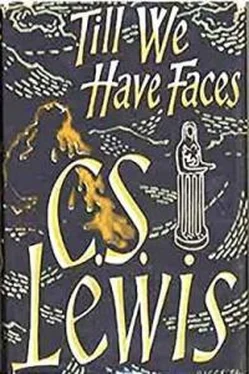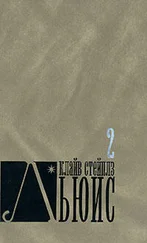“Woman,” it said, “who are you?”
“Orual, Queen of Glome,” said I.
“Then it is not you that I was sent to help. What is that roll you carry in your hands?”
I now saw, with great dismay, that what I had been carrying all this time was not a bowl but a book. This ruined everything.
“It is my complaint against the gods,” said I.
The eagle clapped his wings and lifted his head and cried out with a loud voice, “She’s come at last. Here is the woman who has a complaint against the gods.”
Immediately a hundred echoes roared from the face of the mountain, “Here is the woman … a complaint against the gods … plaint against the gods.”
“Come,” said the eagle.
“Where?” said I.
“Come into court. Your case is to be heard.” And he called aloud once more, “She’s come. She’s come.” Then from every crack and hole in the mountains there came out dark things like men, so that there was a crowd of them all round me before I could fly. They seized on me and hustled me and passed me on from one to another, each shouting, towards the mountain–face, “Here she comes. Here is the woman”; and voices (as it seemed) from within the mountain answered them, “Bring her in. Bring her into court. Her case is to be heard.” I was dragged and pushed and sometimes lifted, up among the rocks, till at last a great black hole yawned before me. “Bring her in. The court waits,” came the voices. And with a sudden shock of cold I was hurried in out of the burning sunlight into the dark inwards of the mountain, and then further and further in, always in haste, always passed from hand to hand, and always with that din of shouts: “Here she is. She’s come at last. To the judge, to the judge.” Then the voices changed and grew quieter; and now it was, “Let her go. Make her stand up. Silence in the court. Silence for her complaint.”
I was free now from all their hands, alone (as I thought) in silent darkness. Then a sort of grey light came. I stood on a platform or pillar of rock in a cave so great that I could see neither the sides nor the roof of it. All round me, below me, up to the very edges of the stone I stood on, there surged a sort of unquiet darkness. But soon my eyes grew able to see things in that half–light. The darkness was alive. It was a great assembly, all staring upon me, and I uplifted on my perch above their heads. Never in peace or war have I seen so vast a concourse. There were tens of thousands of them, all silent; every face watching me. Among them I saw Batta, and the King my father, and the Fox, and Argan. They were all ghosts. In my foolishness I had not thought before how many dead there must be. The faces, one above the other (for the place was shaped that way) rose and rose and receded in the greyness till the very thought of counting—not the faces, that would be madness—but the mere ranks of them, was tormenting. The endless place was packed full as it could hold. The court had met.
But on the same level with me, though far away, sat the judge. Male or female, who could say? Its face was veiled. It was covered from crown to toe in sweepy black.
“Uncover her,” said the judge.
Hands came from behind me and tore off my veil; after it, every rag I had on. The old crone with her Ungit face stood naked before those countless gazers. No thread to cover me, no bowl in my hand to hold the water of death; only my book.
“Read your complaint,” said the judge.
I looked at the roll in my hand and saw at once that it was not the book I had written. It couldn’t be; it was far too small. And too old—a little, shabby, crumpled thing, nothing like my great book that I had worked on all day, day after day, while Bardia was dying. I thought I would fling it down and trample on it. I’d tell them someone had stolen my complaint and slipped this thing into my hand instead. Yet I found myself unrolling it. It was written all over inside, but the hand was not like mine. It was all a vile scribble; each stroke mean and yet savage, like the snarl of my father’s voice, like the ruinous faces one could make out in the Ungit stone. A great terror and loathing came over me. I said to myself, “Whatever they do to me, I will never read out this stuff. Give me back my Book.” But already I heard myself reading it. And what I read out was like this:
“I know what you’ll say. You will say the real gods are not at all like Ungit, and that I was shown a real god and the house of a real god and ought to know it. Hypocrites! I do know it. As if that would heal my wounds! I could have endured it if you were things like Ungit and the Shadowbrute. You know well that I never really began to hate you until Psyche began talking of her palace and her lover and her husband. Why did you lie to me? You said a brute would devour her. Well, why didn’t it? I’d have wept for her and buried what was left and built her a tomb and … and … But to steal her love from me! Can it be that you really don’t understand? Do you think we mortals will find you gods easier to bear if you’re beautiful? I tell you that if that’s true we’ll find you a thousand times worse. For then (I know what beauty does) you’ll lure and entice. You’ll leave us nothing; nothing that’s worth our keeping or your taking Those we love best—whoever’s most worth loving—those are the very ones you’ll pick out. Oh, I can see it happening, age after age, and growing worse and worse the more you reveal your beauty; the son turning his back on the mother and the bride on her groom, stolen away by this everlasting calling, calling, calling of the gods. Taken where we can’t follow. It would be far better for us if you were foul and ravening. We’d rather you drank their blood than stole their hearts. We’d rather they were ours and dead than yours and made immortal. But to steal her love from me, to make her see things I couldn’t see … oh, you’ll say (you’ve been whispering it to me these forty years) that I’d signs enough her palace was real; could have known the truth if I’d wanted. But how could I want to know it? Tell me that. The girl was mine. What right had you to steal her away into your dreadful heights? You’ll say I was jealous. Jealous of Psyche? Not while she was mine. If you’d gone the other way to work—if it was my eyes you had opened—you’d soon have seen how I would have shown her and told her and taught her and led her up to my level. But to hear a chit of a girl who had (or ought to have had) no thought in her head that I’d not put there, setting up for a seer and a prophetess and next thing to a goddess … how could anyone endure it? That’s why I say it makes no difference whether you’re fair or foul. That there should be gods at all, there’s our misery and bitter wrong. There’s no room for you and us in the same world. You’re a tree in whose shadow we can’t thrive. We want to be our own. I was my own and Psyche was mine and no one else had any right to her. Oh, you’ll say you took her away into bliss and joy such as I could never have given her, and I ought to have been glad of it for her sake. Why? What should I care for some horrible, new happiness which I hadn’t given her and which separated her from me? Do you think I wanted her to be happy, that way? It would have been better if I’d seen the Brute tear her in pieces before my eyes. You stole her to make her happy, did you? Why, every wheedling, smiling, catfoot rogue who lures away another man’s wife or slave or dog might say the same. Dog, now. That’s very much to the purpose. I’ll thank you to let me feed my own; it needed no titbits from your table. Did you ever remember whose the girl was? She was mine. Mine ; do you not know what the word means? Mine! You’re thieves, seducers. That’s my wrong. I’ll not complain (not now) that you’re blood–drinkers and man–eaters. I’m past that….”
Читать дальше











